16 Fruits that Start with V with Facts and Pictures

Vitamin-rich fruits are key to a healthy diet, but finding a variety can be tricky. If you’re looking to expand your fruit choices, you might wonder about fruits that start with the letter V.
While not as common, these fruits pack a nutritional punch and can add excitement to your meals.
I’ve got good news for you. There are several vitamin-packed fruits that begin with V, and I’m here to introduce you to them.
In this article, I’ll share a list of 16 vitamin-rich fruits starting with V. You’ll learn about their nutritional benefits and how to include them in your diet.
Let’s explore these lesser-known but equally nutritious fruits together.
1. Vaccarese Grape

The Vaccarese grape is a red wine grape variety primarily grown in France, known for its robust flavor and deep color. It is often used in blends to enhance the structure and richness of wines.
The grape is not widely known outside of wine enthusiast circles but holds significant importance in traditional French viticulture.
- Place of Origin: France
- Scientific Name: Vitis vinifera
- Famous Alternative Names: Brun Argenté
Nutritional Content per 100 grams:
| Nutrient | Amount |
|---|---|
| Calories | 69 kcal |
| Carbohydrates | 18 g |
| Sugars | 15 g |
| Vitamin C | 10 mg |
Health Benefits:
- This fruit supports heart health by reducing blood pressure.
- It helps to improve blood circulation due to its high iron content.
- Greatly promotes healthy skin with its antioxidant properties.
- Boosts the immune system with a good amount of Vitamin C.
- Aids in digestion due to dietary fiber content.
2. Valencia Orange

Valencia Oranges are sweet citrus fruits renowned for their juiciness and bright flavor. They are commonly used for juice production and are highly appreciated for their balance of sweetness and acidity.
This orange is available throughout summer, making it a popular choice for fresh orange juice.
- Place of Origin: Spain
- Scientific Name: Citrus sinensis
- Famous Alternative Names: Summer Orange
Nutritional Content per 100 grams:
| Nutrient | Amount |
|---|---|
| Calories | 47 kcal |
| Carbohydrates | 12 g |
| Sugars | 9 g |
| Vitamin C | 53 mg |
Health Benefits:
- It greatly enhances immune function with high Vitamin C content.
- Promotes collagen production for healthier skin.
- It also aids in iron absorption, improving blood health.
- This fruit supports weight management with its low-calorie content.
- It helps maintain healthy blood pressure levels.
3. Velvet Apple

The Velvet Apple is a tropical fruit known for its velvety skin and sweet, creamy flesh. It is often eaten fresh or used in desserts in various Southeast Asian cuisines.
The fruit has a distinct aroma and flavor sets it apart from other tropical fruits.
- Place of Origin: Philippines
- Scientific Name: Diospyros blancoi
- Famous Alternative Names: Mabolo
Nutritional Content per 100 grams:
| Nutrient | Amount |
|---|---|
| Calories | 60 kcal |
| Carbohydrates | 15 g |
| Sugars | 10 g |
| Vitamin A | 50 IU |
| Vitamin C | 25 mg |
Health Benefits:
- This fruit promotes eye health with its high Vitamin A content.
- It boosts the immune system due to its Vitamin C.
- Supports digestive health with its dietary fiber.
- It helps maintain healthy skin and tissues.
- Also, it reduces inflammation with its antioxidant properties.
4. Victoria Plum

Victoria plum is a popular plum known for its sweet flavor and vibrant color. It is commonly used in jams, jellies, and desserts.
This fruit is favored for its juicy texture and versatility in culinary applications.
- Place of Origin: England
- Scientific Name: Prunus domestica
- Famous Alternative Names: None
Nutritional Content per 100 grams:
| Nutrient | Amount |
|---|---|
| Calories | 46 kcal |
| Carbohydrates | 11 g |
| Sugars | 9 g |
| Vitamin C | 9 mg |
| Vitamin K | 6.4 mcg |
Health Benefits:
- This fruit aids in digestion with its dietary fiber content.
- Vitamin K greatly supports bone health.
- Improves skin health due to antioxidants.
- Enhances immune function with Vitamin C.
- This helps to regulate blood sugar levels.
5. Vanilla Fruit

The Vanilla Fruit, known for its role in flavoring, is actually the fruit of the vanilla orchid. It is used in a wide range of culinary applications, from desserts to beverages.
Vanilla is prized not only for its flavor but also for its aromatic properties.
- Place of Origin: Mexico
- Scientific Name: Vanilla planifolia
- Famous Alternative Names: Vanilla Bean
Nutritional Content per 100 grams:
| Nutrient | Amount |
|---|---|
| Calories | 288 kcal |
| Carbohydrates | 13 g |
| Sugars | 12.5 g |
| Vitamin B2 | 0.1 mg |
| Vitamin B3 | 0.4 mg |
Health Benefits:
- This fruit supports metabolic health amazingly with B vitamins.
- It helps to improve mental health by reducing stress levels.
- It also enhances skin health with its antioxidant properties.
- It aids in digestion and reduces inflammation.
- The vanilla fruit acts as a natural mood enhancer.
6. Velvet Tamarind

The Velvet Tamarind is a small, dark fruit with a velvety skin, known for its sweet and tangy flavor. It is commonly consumed as a snack or used in beverages and traditional medicine.
This fruit is especially popular in West Africa, where it is valued for its unique taste and health benefits.
- Place of Origin: West Africa
- Scientific Name: Dialium guineense
- Famous Alternative Names: Black Velvet Tamarind
Nutritional Content per 100 grams:
| Nutrient | Amount |
|---|---|
| Calories | 60 kcal |
| Carbohydrates | 15 g |
| Sugars | 13 g |
| Vitamin C | 30 mg |
| Iron | 0.6 mg |
Health Benefits:
- This helps to boost the immune system with high Vitamin C content.
- Enhances iron absorption, preventing anemia.
- Supports digestive health with dietary fiber.
- It helps to reduce oxidative stress with its antioxidant properties.
- This fruit helps in maintaining healthy skin and slowing the aging process.
7. Voavanga Fruit

Voavanga, also known as Spanish Tamarind, is a tropical fruit with a unique taste. It is often enjoyed fresh or used in traditional dishes and beverages.
The fruit is known for its refreshing flavor and nutritional benefits.
- Place of Origin: Madagascar
- Scientific Name: Vangueria madagascariensis
- Famous Alternative Names: Spanish Tamarind
Nutritional Content per 100 grams:
| Nutrient | Amount |
|---|---|
| Calories | 50 kcal |
| Carbohydrates | 12 g |
| Sugars | 10 g |
| Vitamin C | 20 mg |
| Potassium | 200 mg |
Health Benefits:
- Voavanga fruit is rich in potassium, which helps regulate blood pressure and maintain a healthy heart by balancing the effects of sodium in the body.
- The high Vitamin C content in Voavanga fruit strengthens the immune system, helping to protect against common illnesses and infections.
- Potassium and other essential minerals found in Voavanga fruit contribute to proper muscle function and can help in muscle recovery after exercise.
- With its significant water content and essential electrolytes, Voavanga fruit helps keep the body hydrated and maintains electrolyte balance, which is crucial for various bodily functions.
- The antioxidants in Voavanga fruit protect the skin from oxidative stress, reduce signs of aging, and promote a healthy, glowing complexion.
8. Viburnum Berries

Viburnum Berries are small, vibrant fruits known for their tart flavor. They are often used in jams, jellies, and medicinal preparations.
These berries are not only delicious but also packed with nutrients.
- Place of Origin: North America and Europe
- Scientific Name: Viburnum opulus
- Famous Alternative Names: Guelder Rose Berries
Nutritional Content per 100 grams:
| Nutrient | Amount |
|---|---|
| Calories | 30 kcal |
| Carbohydrates | 7 g |
| Sugars | 6 g |
| Vitamin C | 15 mg |
| Fiber | 3 g |
Health Benefits:
- High in Vitamin C, Viburnum berries help strengthen the immune system and protect against common colds and infections.
- The fiber content in Viburnum berries promotes healthy digestion and prevents constipation.
- The anti-inflammatory properties of Viburnum berries help alleviate joint pain and reduce inflammation in the body.
- These berries can help lower cholesterol levels, thereby supporting cardiovascular health.
- Antioxidants in Viburnum berries protect the skin from damage and promote a healthy, radiant complexion.
9. Victoria Pineapple
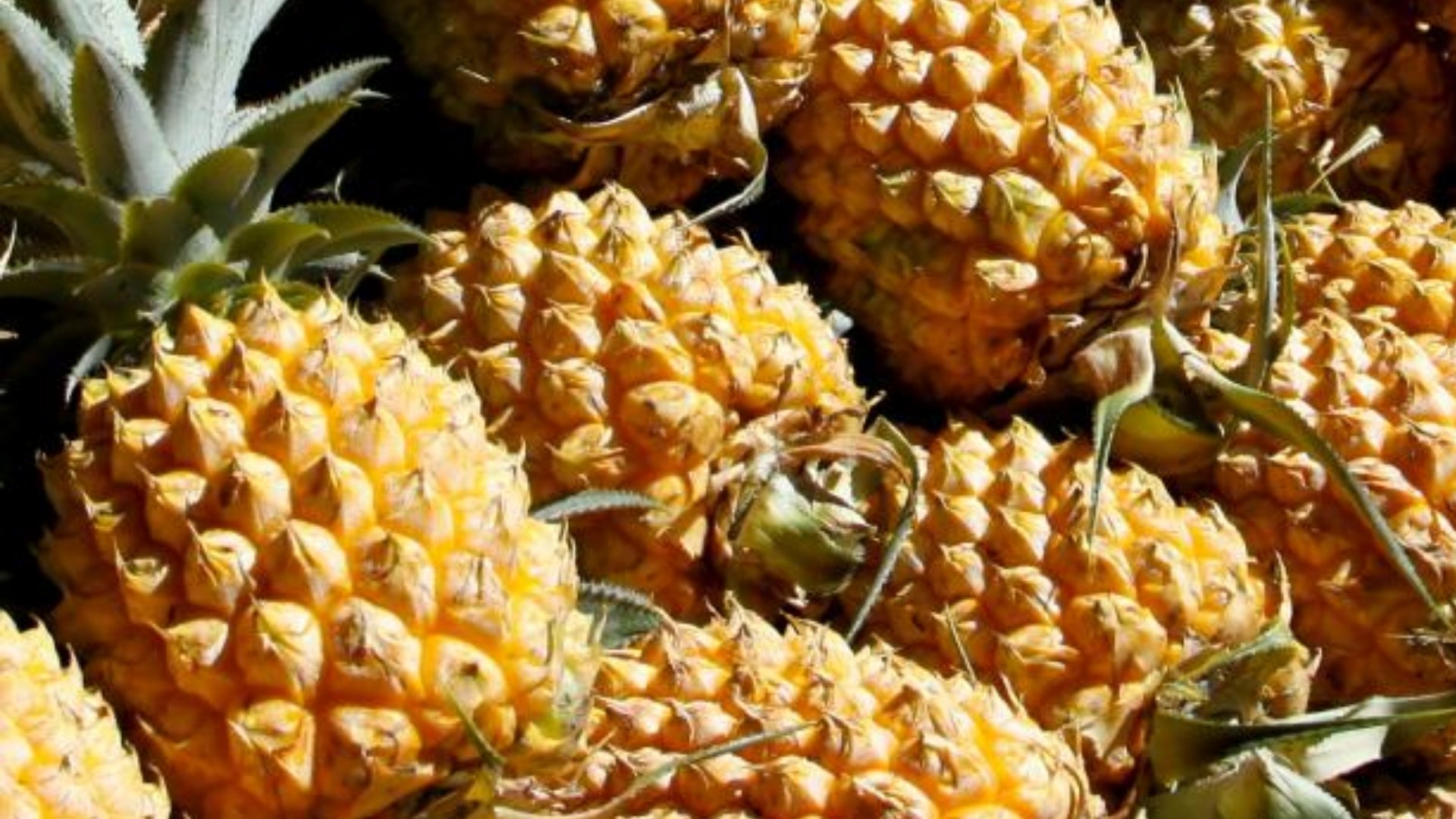
The Victoria Pineapple is a small, sweet variety of pineapple known for its intense flavor. It is highly prized for its juiciness and is often consumed fresh or in desserts.
This pineapple variety is cherished for its rich taste and nutritional value.
- Place of Origin: Réunion Island
- Scientific Name: Ananas comosus
- Famous Alternative Names: Queen Pineapple
Nutritional Content per 100 grams:
| Nutrient | Amount |
|---|---|
| Calories | 50 kcal |
| Carbohydrates | 13 g |
| Sugars | 10 g |
| Vitamin C | 36 mg |
| Potassium | 180 mg |
Health Benefits:
- Victoria Pineapple contains bromelain, an enzyme that helps break down proteins and supports healthy digestion.
- High in Vitamin C, it enhances the immune system and helps protect against illnesses.
- The Vitamin A content supports good vision and eye health.
- Manganese in Victoria Pineapple aids in maintaining strong bones and connective tissues.
- Its anti-inflammatory properties help reduce swelling and inflammation in the body.
10. Vietnamese Guava

Vietnamese Guava is a tropical fruit with a sweet and slightly tangy flavor, known for its crunchy texture. It is often eaten fresh or used in juices and salads.
This fruit is highly nutritious and offers numerous health benefits.
- Place of Origin: Vietnam
- Scientific Name: Psidium guajava
- Famous Alternative Names: Tropical Guava
Nutritional Content per 100 grams:
| Nutrient | Amount |
|---|---|
| Calories | 68 kcal |
| Carbohydrates | 14 g |
| Sugars | 9 g |
| Vitamin C | 228 mg |
| Fiber | 5.4 g |
Health Benefits:
- Exceptionally high in Vitamin C, Vietnamese Guava strengthens the immune system and helps fight off infections.
- Rich in dietary fiber, it promotes healthy digestion and prevents constipation.
- It helps lower blood pressure and improve heart health due to its high potassium content.
- Antioxidants in the fruit reduce signs of aging and promote a healthy complexion.
- It helps regulate blood sugar levels and improves insulin sensitivity.
11. Vangueria Infausta

This tropical round fruit has a tangy-sweet flavor and a slightly mealy texture when ripe.
It is often eaten fresh, dried, or used in traditional dishes and beverages.
The fruit is cherished in local cuisines for its versatility and is commonly found in markets or foraged in the wild.
- Place of Origin: Southern Africa
- Scientific Name: Vangueria infausta
- Famous Alternative Names: African Medlar, Mmilo
Nutritional Content per 100 grams:
| Nutrient | Amount |
|---|---|
| Calories | ~60 kcal |
| Carbohydrates | ~14 g |
| Sugars | ~10 g |
| Vitamin C | ~20 mg |
| Fiber | ~3 g |
Health Benefits:
- Promotes digestive health due to its fiber content, aiding in regular bowel movements.
- Contains antioxidants that reduce oxidative stress and inflammation in the body.
- Provides potassium, which supports heart health by regulating blood pressure.
- Traditionally used to improve skin health and vitality, contributing to a radiant complexion.
12. Valencia Pride Mango
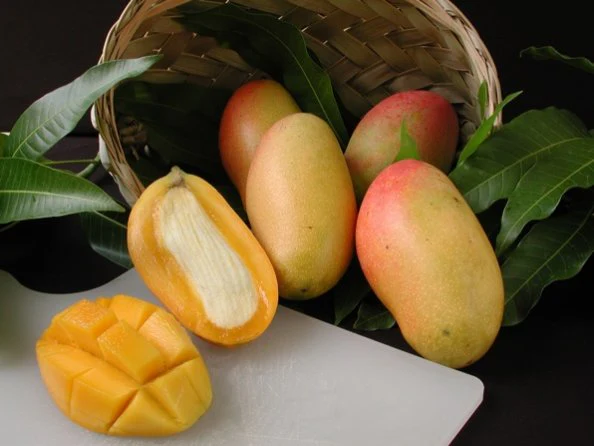
The Valencia Pride Mango is a large, sweet mango variety known for its smooth, fiberless flesh and vibrant color. It is often enjoyed fresh, in smoothies, or as a tropical dish addition.
This mango is highly prized for its excellent taste and juicy texture.
- Place of Origin: Florida, USA
- Scientific Name: Mangifera indica
- Famous Alternative Names: None
Nutritional Content per 100 grams:
| Nutrient | Amount |
|---|---|
| Calories | 60 kcal |
| Carbohydrates | 15 g |
| Sugars | 14 g |
| Vitamin C | 36 mg |
| Vitamin A | 54 IU |
Health Benefits:
- High in Vitamin C, Valencia Pride Mango strengthens the immune system and helps prevent illnesses.
- It contains Vitamin A, essential for maintaining good vision and eye health.
- The dietary fiber content aids in digestion and helps prevent constipation.
- Antioxidants in the mango protect the skin from damage and promote a healthy complexion.
- Its natural sugars provide a quick and healthy source of energy.
13. Volkamer Lemon

The Volkamer Lemon, a hybrid between lemon and sour orange, is noted for its tart yet slightly sweet flavor.
Due to its high juice content and aromatic zest, this lemon variety is commonly used in culinary dishes and beverages. It is also popular for ornamental gardening.
- Place of Origin: Italy
- Scientific Name: Citrus volkameriana
- Famous Alternative Names: Volkamer’s Lemon, Citrus Volkamer
Nutritional Content per 100 grams:
| Nutrient | Amount |
|---|---|
| Calories | 29 kcal |
| Carbohydrates | 9 g |
| Sugars | 2.5 g |
| Vitamin C | 50 mg |
| Fiber | 2.8 g |
Health Benefits:
- High in Vitamin C, Volkamer Lemon enhances immune function and helps prevent infections.
- Its acidic nature aids in digestion and helps alleviate indigestion.
- Rich in antioxidants, it helps maintain healthy, glowing skin and reduces blemishes.
- Low in calories and high in water content, it helps keep the body hydrated.
- It assists in detoxifying the liver and improving overall liver function.
14. Vespolina Grape

The Vespolina Grape is an Italian red grape variety known for its aromatic and flavorful characteristics. It is often used in producing high-quality wines and is appreciated for its rich color and complex taste profile.
This grape variety is cherished in Northern Italy, particularly in the Piedmont region.
- Place of Origin: Italy
- Scientific Name: Vitis vinifera
- Famous Alternative Names: Ughetta, Ughetta di Canneto
Nutritional Content per 100 grams:
| Nutrient | Amount |
|---|---|
| Calories | 69 kcal |
| Carbohydrates | 18 g |
| Sugars | 15 g |
| Vitamin C | 10 mg |
| Iron | 0.5 mg |
Health Benefits:
- Rich in polyphenols, Vespolina grapes help improve heart health and reduce the risk of cardiovascular diseases.
- Antioxidants in these grapes support brain health and improve memory.
- The high antioxidant content helps protect the skin from damage and promotes a youthful appearance.
- The presence of iron and Vitamin C aids in preventing anemia by enhancing iron absorption.
- Low in calories, Vespolina grapes can be a healthy snack that supports weight management efforts.
15. Van Dyke Mango

The Van Dyke Mango is a medium-sized mango known for its vibrant red and yellow skin and sweet, aromatic flesh. It is commonly consumed fresh, added to salads, or used in tropical desserts.
This mango variety is prized for its excellent flavor and minimal fiber content.
- Place of Origin: Florida, USA
- Scientific Name: Mangifera indica
- Famous Alternative Names: None
Nutritional Content per 100 grams:
| Nutrient | Amount |
|---|---|
| Calories | 60 kcal |
| Carbohydrates | 15 g |
| Sugars | 14 g |
| Vitamin C | 36 mg |
| Vitamin A | 54 IU |
Health Benefits:
- High in dietary fiber, Van Dyke Mango promotes healthy digestion and prevents constipation.
- Rich in potassium, it helps regulate blood pressure and maintain cardiovascular health.
- Packed with Vitamin C, this mango variety strengthens the immune system.
- It contains beta-carotene, converted to Vitamin A and supports good vision.
- Its high water content helps keep the body hydrated, especially in hot weather.
16. Vicar of Winkfield Pear

The Vicar of Winkfield Pear is a large, elongated pear variety known for its juicy, buttery texture. Due to its sweet and delicate flavor, it is often enjoyed fresh or used in baking and cooking.
This pear is particularly popular in Europe for its excellent taste and versatility in culinary applications.
- Place of Origin: France
- Scientific Name: Pyrus communis
- Famous Alternative Names: Cure, Le Cure, Monsieur le Curé
Nutritional Content per 100 grams:
| Nutrient | Amount |
|---|---|
| Calories | 57 kcal |
| Carbohydrates | 15 g |
| Sugars | 10 g |
| Vitamin C | 4.3 mg |
| Fiber | 3.1 g |
Health Benefits:
- High in dietary fiber, Vicar of Winkfield Pear aids in digestion and prevents constipation.
- It contains Vitamin C, which helps strengthen the immune system and fight off infections.
- It helps lower cholesterol levels due to its fiber content, contributing to better heart health.
- Rich in Vitamin K, it supports bone density and overall bone health.
- Low calories make it a healthy snack that supports weight management goals.
17. Verdelho Grape
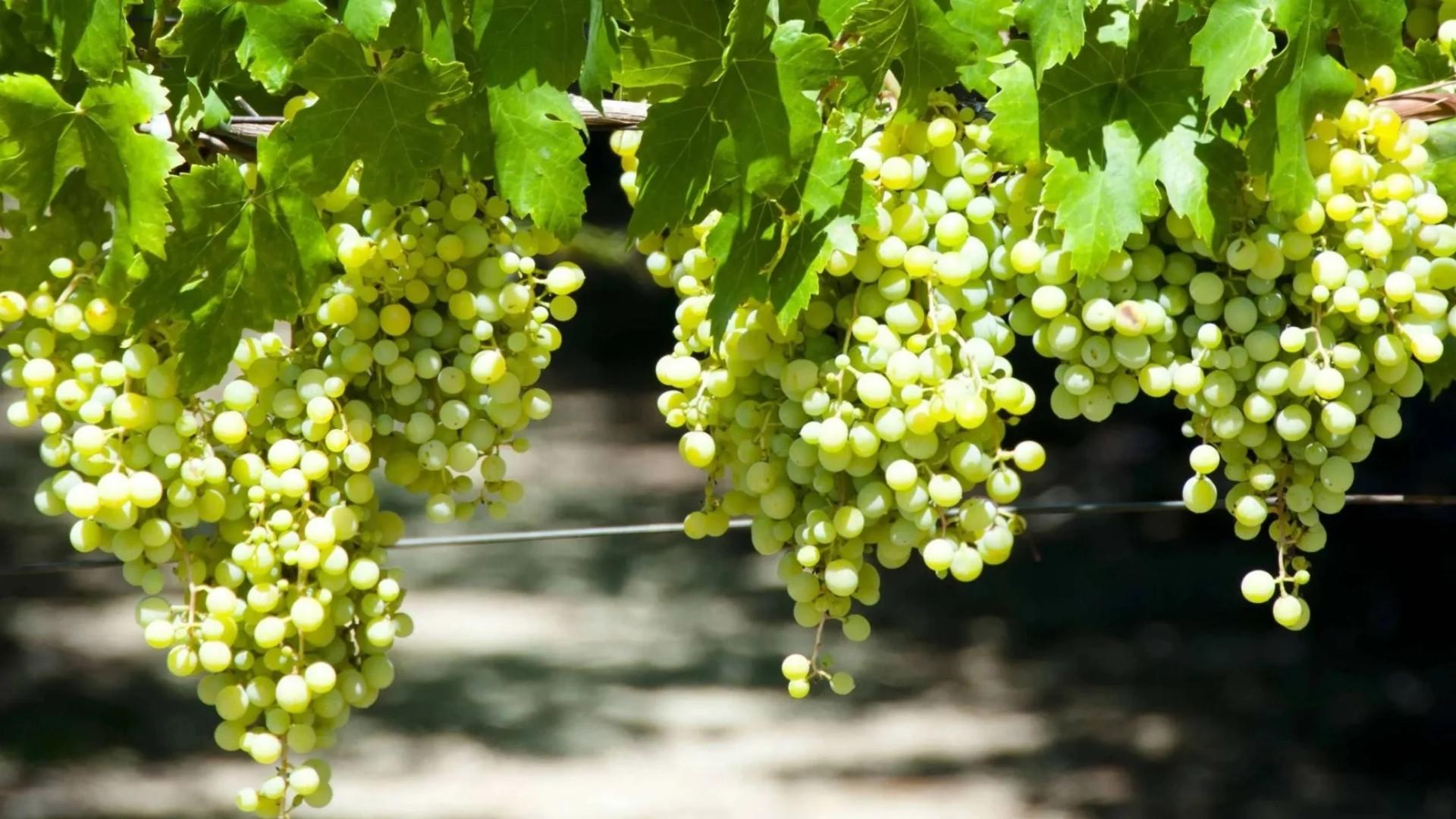
This white wine grape, primarily grown in Portugal and Australia, is prized for its crisp, aromatic profile.
It is used in both table wines and high-quality wines like Madeira, offering a bright, citrusy flavor with floral notes.
- Place of Origin: Portugal
- Scientific Name: Vitis vinifera
- Famous Alternative Names: Verdelho Branco, Verdelho de Madeira
Nutritional Content per 100 grams
| Nutrient | Amount |
|---|---|
| Calories | ~69 kcal |
| Carbohydrates | ~18 g |
| Sugars | ~15 g |
| Vitamin C | ~10 mg |
| Iron | ~0.4 mg |
Health Benefits
- Supports heart health with polyphenols that reduce cardiovascular risk.
- Provides antioxidants to protect against oxidative stress and inflammation.
- Boosts immune function with moderate Vitamin C content.
- Aids digestion due to its dietary fiber content.
18. Vernaccia Grape
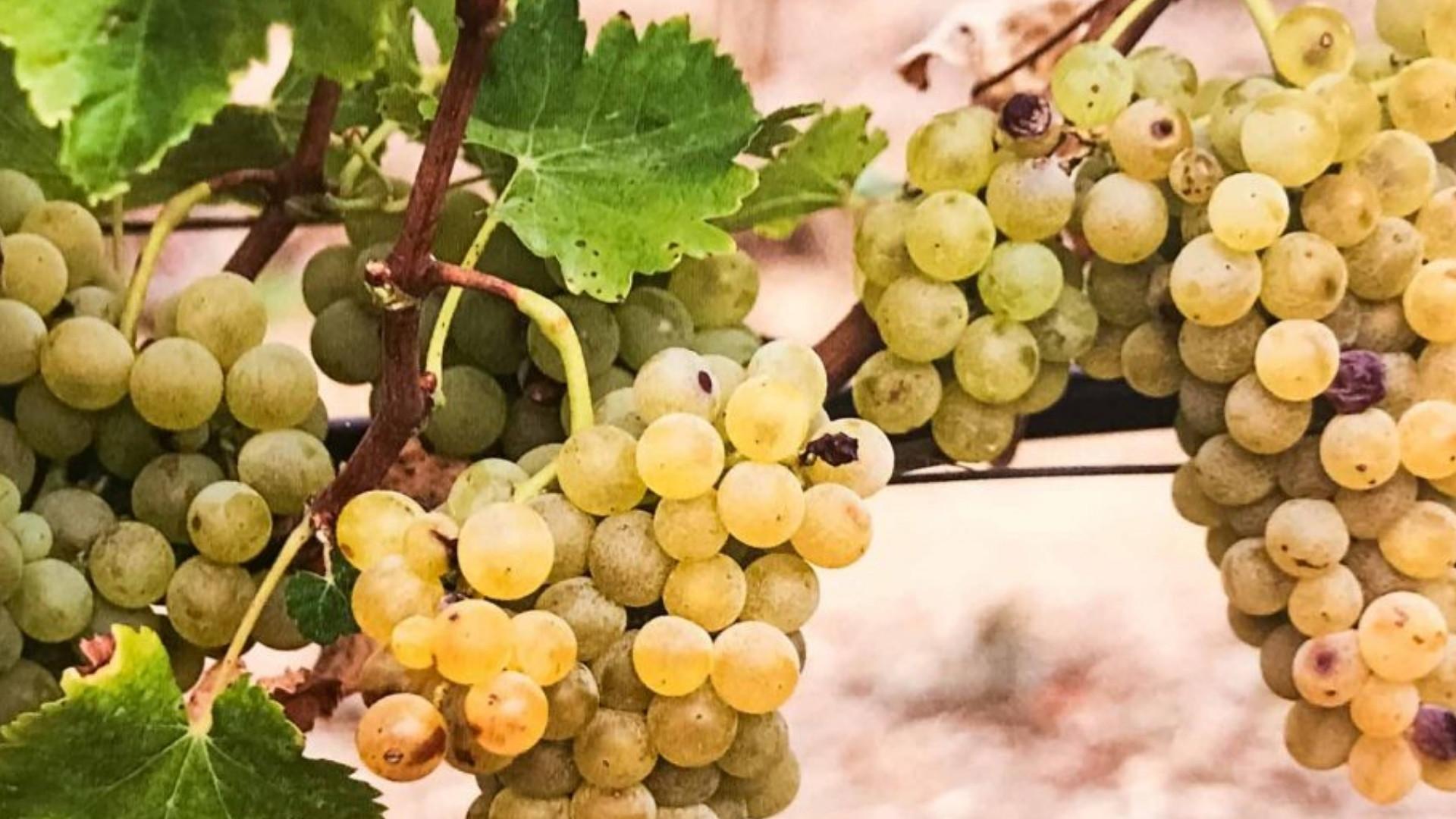
A white wine grape, with the same scientific family as Verdelho Grape, is celebrated for its role in producing Vernaccia di San Gimignano, a crisp and mineral-rich wine.
Its small, golden berries offer a delicate flavor, making it suitable for both winemaking and fresh consumption in some regions.
- Place of Origin: Italy
- Scientific Name: Vitis vinifera
- Famous Alternative Names: Vernaccia di San Gimignano, Vernaccia Bianca
Nutritional Content per 100 grams
| Nutrient | Amount |
|---|---|
| Calories | ~69 kcal |
| Carbohydrates | ~18 g |
| Sugars | ~15 g |
| Vitamin C | ~10 mg |
| Potassium | ~190 mg |
Health Benefits
- Promotes heart health with antioxidants like resveratrol.
- Supports skin health by reducing oxidative damage.
- Enhances immune function with Vitamin C.
- Aids in maintaining healthy blood pressure due to potassium content.
19. Verna Lemon
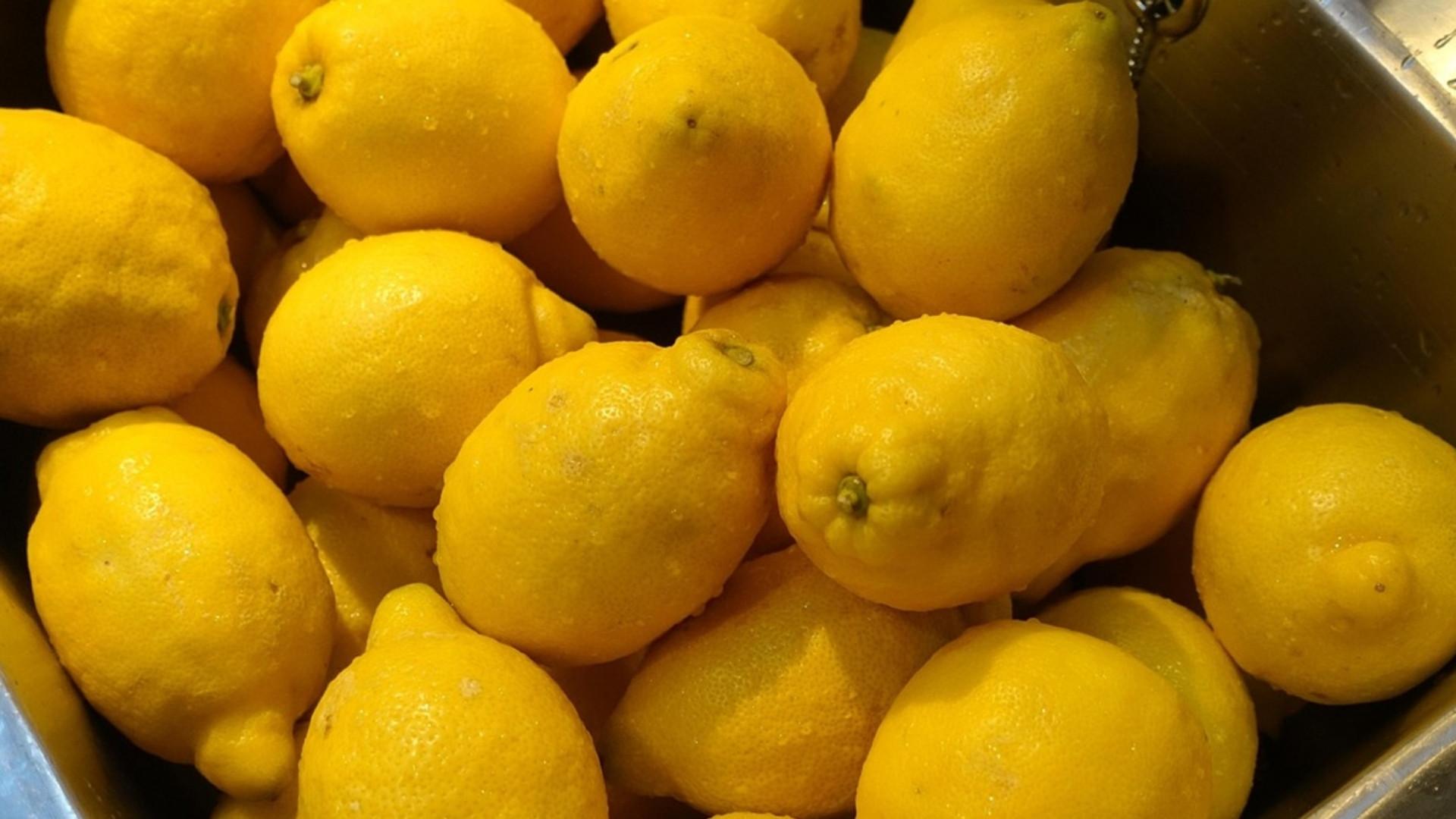
This large, juicy lemon variety is known for its lower acidity compared to other lemons, making it ideal for culinary uses like juices, desserts, and garnishes.
Its thick skin and abundant juice make it a favorite in Mediterranean cuisines.
- Place of Origin: Spain
- Scientific Name: Citrus limon
- Famous Alternative Names: None
Nutritional Content per 100 grams
| Nutrient | Amount |
|---|---|
| Calories | ~29 kcal |
| Carbohydrates | ~9 g |
| Sugars | ~2.5 g |
| Vitamin C | ~53 mg |
| Fiber | ~2.8 g |
Health Benefits
- Boosts immune system with high Vitamin C content.
- Supports digestion with its acidic nature and fiber content.
- Promotes skin health through antioxidants that reduce blemishes.
- Aids hydration due to its high water content.
20. Villafranca Lemon
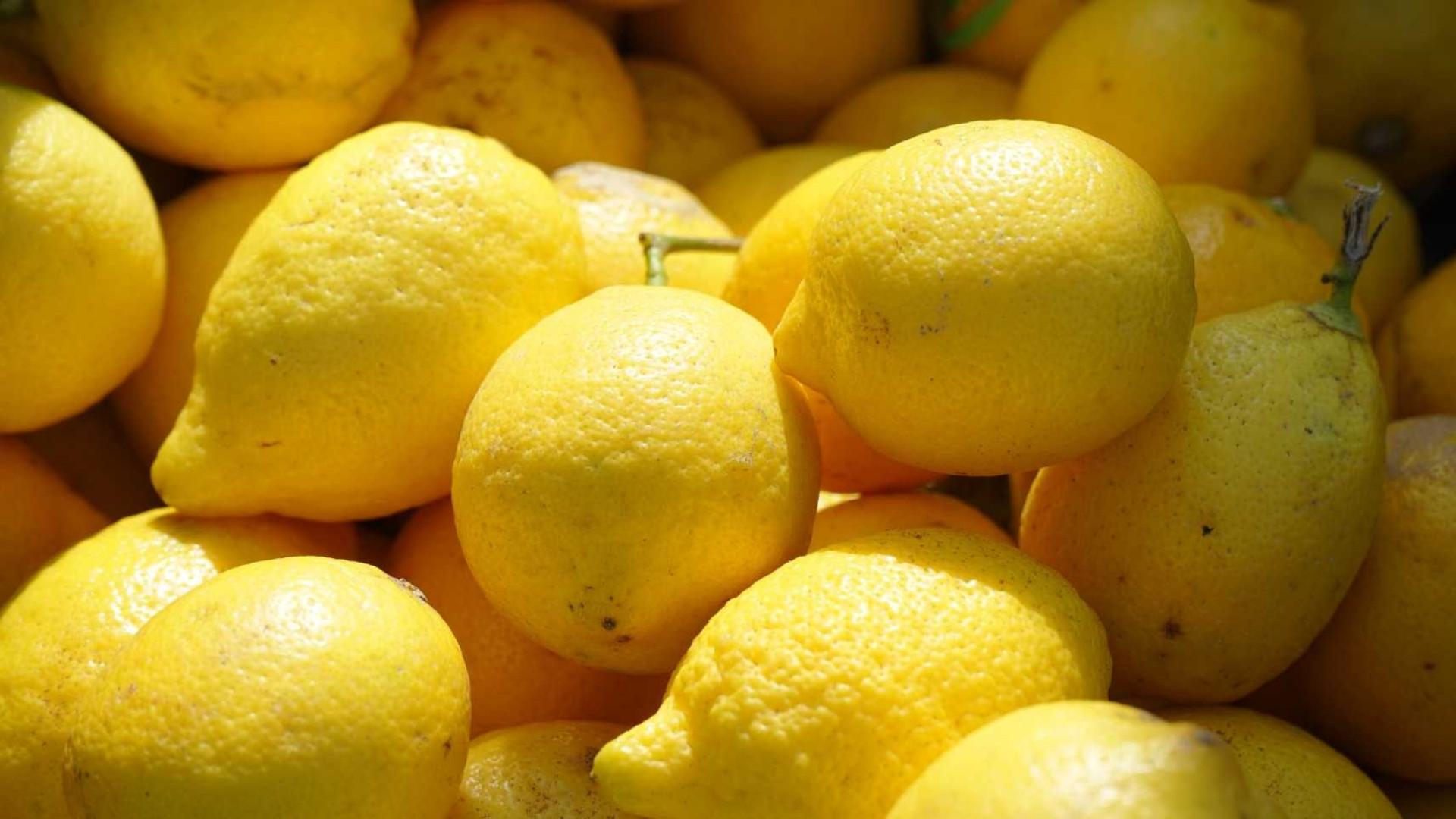
A popular lemon variety similar to the Eureka lemon, this fruit is widely grown in Mediterranean climates and valued for its juicy flesh and tangy flavor.
It is commonly used in cooking, baking, and beverages, offering versatility in both sweet and savory dishes.
- Place of Origin: Italy
- Scientific Name: Citrus limon
- Famous Alternative Names: None
Nutritional Content per 100 grams
| Nutrient | Amount |
|---|---|
| Calories | ~29 kcal |
| Carbohydrates | ~9 g |
| Sugars | ~2.5 g |
| Vitamin C | ~50 mg |
| Fiber | ~2.8 g |
Health Benefits
- Enhances immune function with significant Vitamin C content.
- Supports digestive health by aiding in acid balance and fiber intake.
- Promotes radiant skin with antioxidants that combat free radicals.
- Assists in liver detoxification due to its citric acid content.
21. Verdone Plum
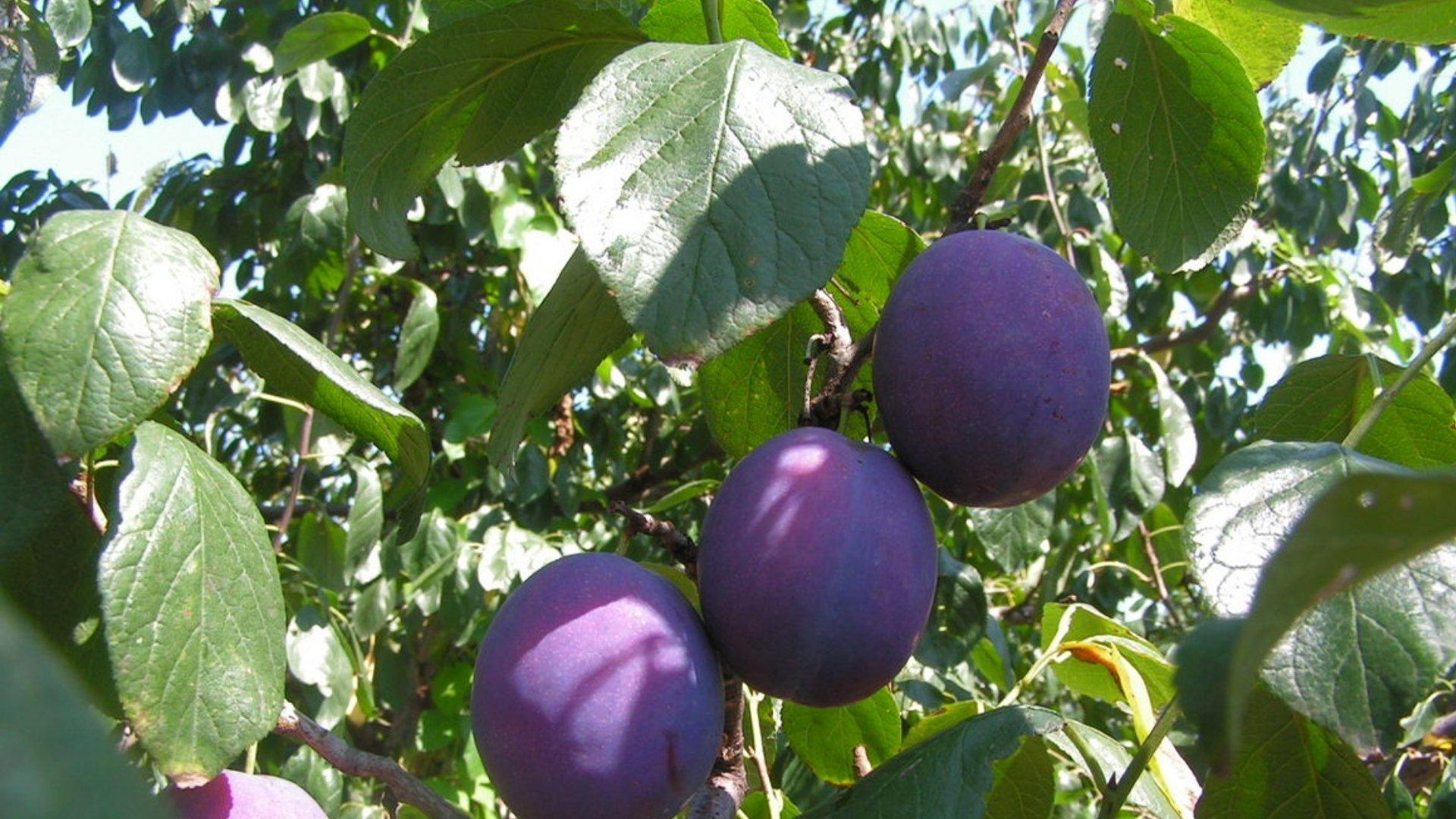
This European plum variety, often grown in Italy, is known for its sweet, juicy flesh and single pit.
It is enjoyed fresh, dried as a prune, or used in jams and desserts, making it a versatile addition to various dishes.
- Place of Origin: Italy
- Scientific Name: Prunus domestica
- Famous Alternative Names: None
Nutritional Content per 100 grams
| Nutrient | Amount |
|---|---|
| Calories | ~46 kcal |
| Carbohydrates | ~11 g |
| Sugars | ~9 g |
| Vitamin C | ~9 mg |
| Fiber | ~1.4 g |
Health Benefits
- Promotes digestive health with dietary fiber to prevent constipation.
- Supports bone health with Vitamin K and trace minerals.
- Provides antioxidants to improve skin health and reduce aging signs.
- Helps regulate blood sugar levels with low glycemic impact.
22. Violette De Bordeaux Fig
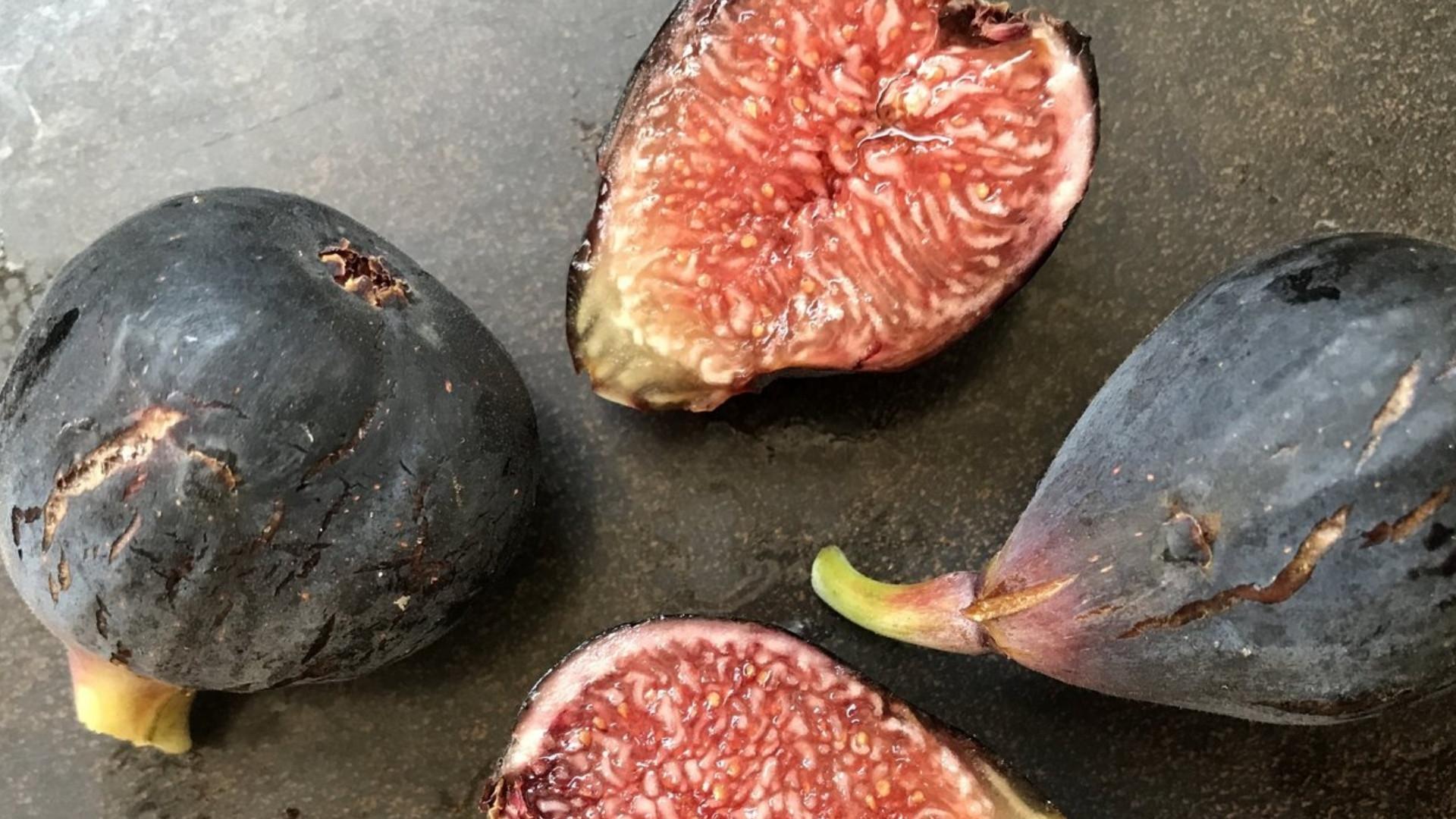
A small, dark-purple fig variety, this fruit is prized for its intensely sweet flavor and soft texture.
Grown in Mediterranean climates and popular in specialty markets, it is eaten fresh, dried, or used in desserts and preserves.
- Place of Origin: France
- Scientific Name: Ficus carica
- Famous Alternative Names: Negronne Fig
Nutritional Content per 100 grams
| Nutrient | Amount |
|---|---|
| Calories | ~74 kcal |
| Carbohydrates | ~19 g |
| Sugars | ~16 g |
| Vitamin C | ~2 mg |
| Fiber | ~2.9 g |
Health Benefits
- Supports digestive health with high fiber content.
- Provides antioxidants to protect against cellular damage.
- Aids heart health with potassium and low sodium content.
- Promotes healthy blood sugar regulation due to natural sugars and fiber.
23. Variegated Pink Lemon
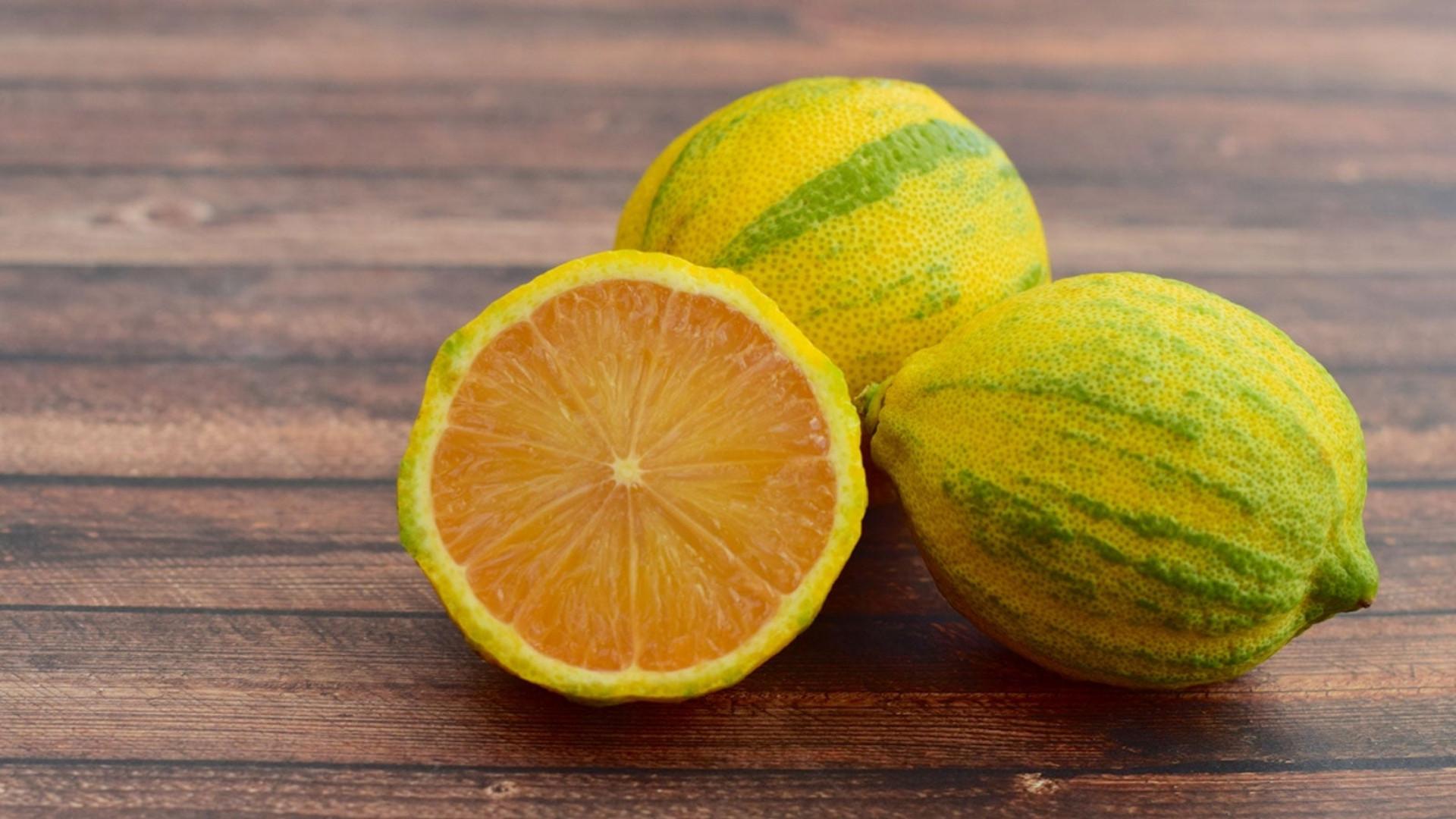
This unique lemon cultivar, with its green-and-yellow striped skin and pink flesh, is both ornamental and culinary.
It is used for its tangy juice and zest in beverages, desserts, and garnishes.
- Place of Origin: United States
- Scientific Name: Citrus limon ‘Eureka Variegated Pink’
- Famous Alternative Names: Pink Lemonade Lemon
Nutritional Content per 100 grams
| Nutrient | Amount |
|---|---|
| Calories | ~29 kcal |
| Carbohydrates | ~9 g |
| Sugars | ~2.5 g |
| Vitamin C | ~50 mg |
| Fiber | ~2.8 g |
Health Benefits
- Boosts immunity with high Vitamin C content.
- Supports digestion with fiber and citric acid.
- Promotes skin health with antioxidants that reduce oxidative stress.
- Aids hydration and detoxification due to its high water content.
Conclusion
Now you know about vitamin-rich fruits that start with V. These aren’t just tasty; they’re packed with nutrients that can boost your health.
Each fruit offers something unique, from the familiar Valencia oranges to the exotic voavanga.
Why does this matter to you? Adding these fruits to your diet can help you get more vitamins and minerals. It’s an easy way to improve your nutrition without making big changes.
What’s next? Try to include one or two of these fruits in your meals this week. You might find a new favorite! If you can’t find some rarer fruits locally, look for them at specialty stores or farmers’ markets.
Have you tried any of these V fruits before? Share your experiences in the comments below.






